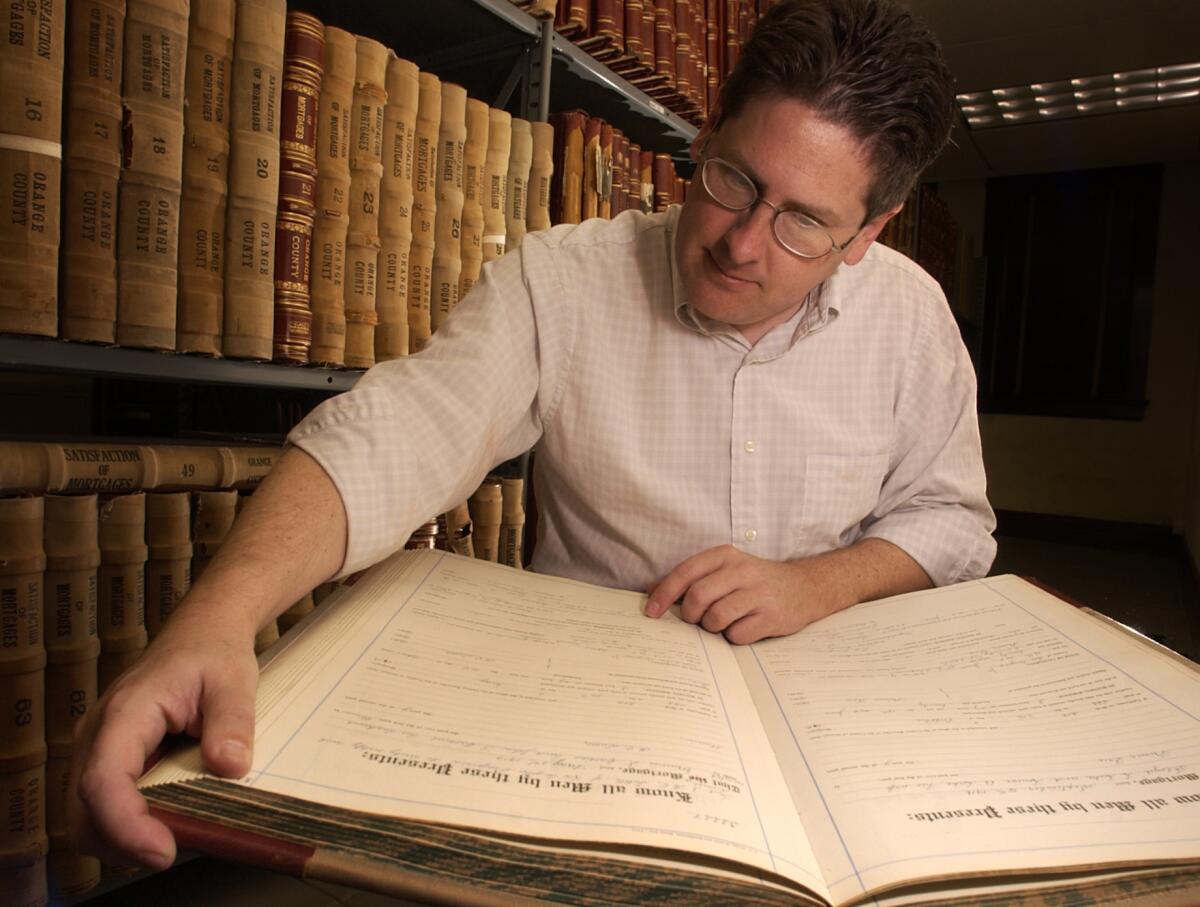Phil Brigandi, chronicler of Orange County’s history, dies at 60

- Share via
Phil Brigandi, an archivist and historian who for more than 40 years recorded Orange County’s stories in books and articles, has died.
Brigandi died Dec. 12 at St. Joseph Hospital — where he was born — from complications of a heart attack he had suffered days earlier, said Chris Jepsen, a longtime friend and president of the Orange County Historical Society. He was 60.
“Phil was the preeminent historian for Orange County,” Jepsen said. “If you want to learn about the history of the O.C., the local Boy Scouts, of Temecula, his name comes up over and over again. … He was the official historian for the community of Orange. Everybody knew it and everybody went to him.”
Beginning in 1975, Brigandi chronicled the histories of his hometown of Orange and of Riverside and San Diego counties, joining the Orange Community Historical Society’s board of directors at 19, the youngest ever to hold that post. At 23, he became a member of the Orange County Historical Commission.
“I have always focused more on the older stories,” he wrote on his website. “Not that our recent history is not fascinating, but there are others better equipped to tell those stories. Besides, there does come a point where these stories cease to be history and become current events.”
Brigandi’s work was extensive. Over the years, he covered people, agriculture and the Santa Ana winds as well as businesses, newspapers and the Southern Pacific, Orange County’s first railroad.
Just before he turned 19, Brigandi wrote his first full-length manuscript, and at 23, he published his first book, about a play in the 1880s. The proceeds from the book were used to restore a fountain in a plaza in Orange.
Several years after college, he accepted a job in Hemet as the Ramona Pageant Assn.’s historian and museum curator. He held that job for 13 years.
He returned to Orange County in 2003 to take a job as as full-time archivist, the first since 1995, when the county went bankrupt and shut the office to save money.
“Some people like the analogy of solving a mystery, but I prefer the image of a jigsaw puzzle,” Brigandi told The Times in 2004. “As you get more pieces, you can start to get a picture of what was going on and where the holes are.”
He held that position for nearly five years before becoming a historical consultant. He never stopped documenting Orange County’s history.
Brigandi’s love and interest in local history dated to his childhood. “I thought fourth-grade California history was the greatest thing since sliced bread,” he wrote on his website. As a student at Orange High School, he was offered the chance to write about his school’s history and spent hours interviewing early alumni, who encouraged him to join the local historical society.
“This was the first research project I ever did,” Brigandi told the Orange County Register in 1997. “It was what marked the first of my career as an historian.”
Phillip K. Brigandi was born in Orange on June 29, 1959, to Pamela and Michael, a ride operator at Disneyland who later worked for the Orange County Probation Department.
Brigandi graduated from Cal State Fullerton and as a teenager earned the rank of Eagle Scout. For decades after, he took several weeks off during the summers to volunteer for the Boy Scouts’ Schoepe Scout Reservation at Lost Valley in northeastern San Diego County.
Before he died, Brigandi was completing an update to his 2010 book about Scouting’s first century in Orange County, Jepsen said.
Besides being an avid hiker and backpacker, Brigandi was also quite the storyteller, Jepsen said.
A teller of historical truths, Brigandi was also a great liar; he won several competitions at Borrego Springs’ annual Pegleg Smith Liars Contest.
“He won so many years until he was finally told he could no longer compete,” Jepsen recalled. Instead, he was asked to emcee the events. “He always said, ‘I saved up all my lies for one day.’”
For Brigandi, telling and researching local history was more than just a job, Jepsen said. It was a calling, and one that connected him to the past.
As Brigandi once wrote: “At its best, local history can help give all of us a sense of connection to the past, a sense of belonging, a sense of place. We are all part of a larger story. If I can help build a growing appreciation of Orange County’s past, my work will be worthwhile.”
He is survived by two brothers.
More to Read
Start your day right
Sign up for Essential California for the L.A. Times biggest news, features and recommendations in your inbox six days a week.
You may occasionally receive promotional content from the Los Angeles Times.








